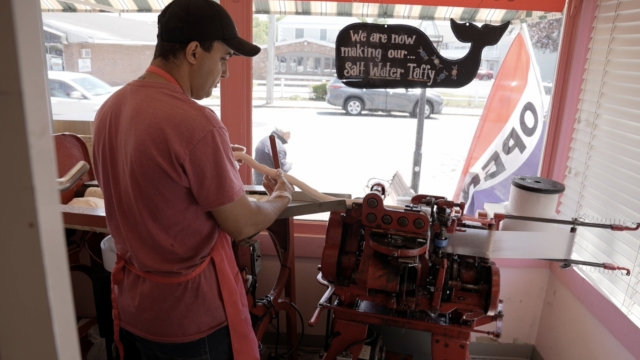For Paulo Paraguay, the first week of June is always an especially sweet time of year on Cape Cod.
As the owner of the Kandy Korner in Hyannis, Massachusetts, the 34-year-old knows the most lucrative time of the year for his small business is just off the horizon.
"We always say Memorial Day is the kickoff to summer," Paraguay said, sitting on the front steps of his candy store in this idyllic coastal New England town.
But for Paraguay, something other than the candy here is sour this year.
"Our biggest concern with staffing is definitely housing, trying to make sure we have enough housing," Paraguay said.
Unlike last summer, he has plenty of people applying for jobs — there's just nowhere for them to live. Like many seasonal communities, Cape Cod's population explodes in the summer, from 200,000 year-round residents to 5 million visitors.
An influx of tourists, though, requires an influx of labor.
"I'm worried we'll be left with a shortage in the workforce," he said.
Paraguay is hardly alone in his struggle to house employees.
Across countless seasonal communities nationwide, business owners are scrambling to find last-minute housing accommodations for employees or risk not having the workers they need this year.
Jake Dewey opened a boat rental business in Hyannis in 2006. He says he never intended to become a landlord.
But summer after summer, he couldn't hire the workers he needed because they couldn't find any affordable place to live.
"I'm sure all of these restaurant owners never thought they would be landlords on top of owning their business," Dewey said. "I just saw a long time ago a need."
Like many business owners here, Dewey started buying and building condos a few years ago.
Most are one-year leases that are critical to combating the housing shortage, Dewey says, especially when most properties have become second homes or Airbnb rentals.
"It's a nationwide problem, especially in resort and second-home communities," he added.
The affordable housing problem is not unique to Cape Cod. From Mt. Rainier National Park in Washington; to Ocean City, Maryland; to Park City, Utah.
Countless seasonal communities are struggling to house their workers, as many Americans working remotely have either bought or moved into second homes, which has drastically decreased rental property inventory.
The shortage is also impacting J-1 Visa Exchange students. J-1 Visas provide around 300,000 foreign visitors from 200 countries the ability to work in the U.S. each year.
Prior to the pandemic, an estimated 5,000 worked on Cape Cod each summer. Business owners say they're a critical component to the workforce.
"The businesses have to work less hours or less days of the week they are open. They don't have the help; they can't function as they need to function," said Cape Cod Chamber of Commerce Workforce Housing Coordinator Christina Arabadzhieva.
She currently has a list of 100 J-1 students who have all found summer jobs on Cape Cod, but they currently don't have housing.
If Arabadzhieva can't find these student workers housing before they arrive, they'll be sent to other cities across the country, putting Cape Cod businesses in a precarious position.
"There's just not enough inventory," she said.
On Cape Cod, they've started thinking outside the box — looking to college dorms for summer housing and are even going to senior centers to see if older folks living alone have an extra room to rent.
Julian Cyr, a lifelong Cape Cod resident and Democratic state senator in Massachusetts, has been working to fix the affordable housing crisis for years.
"You need to provide housing for employees, and if you don't have housing, you won't be able to staff your restaurant, staff your hotel," Cyr said. "What kind of destination will Cape Cod be if there's not local and year-round flavor here?"
With summer sitting just off the horizon, many seasonal workers are now wondering if they can keep themselves financially afloat.
Trending stories at Scrippsnews.com




